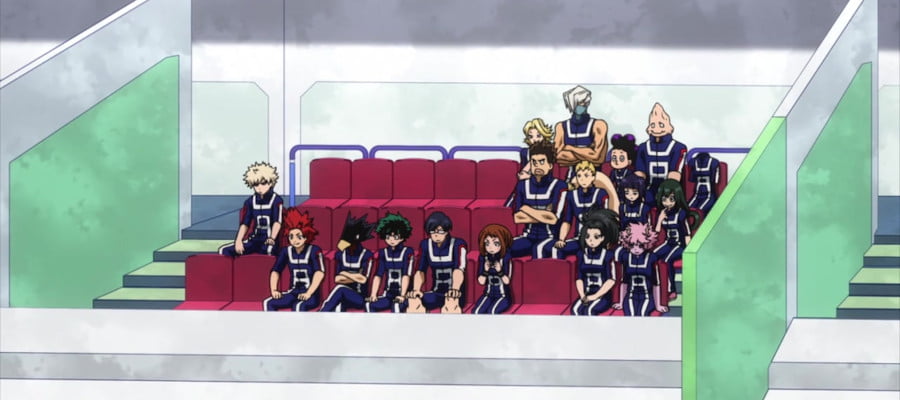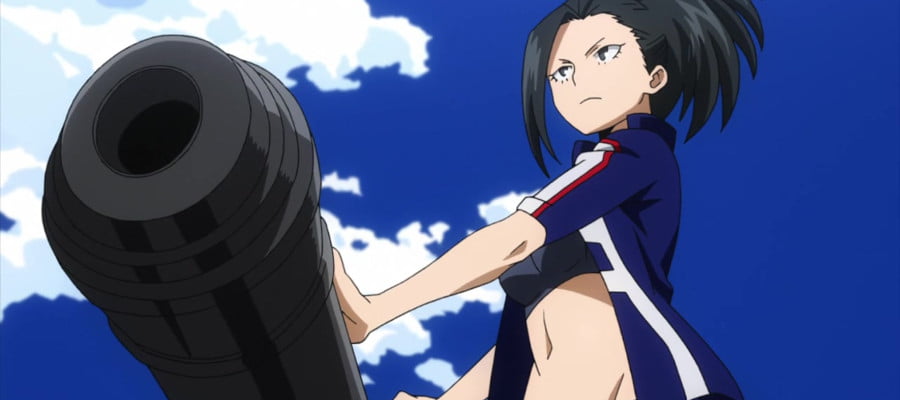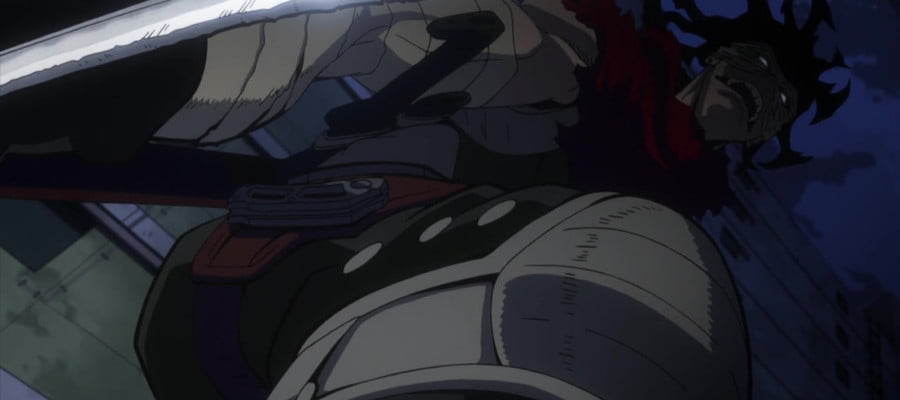You can tell the quality of a shounen series by how quickly it turns to a tournament arc in order to fill out its episodes. Tournament arcs are a break-in-case-of-emergency story beat for any game in the fighting shonen battle franchise, because while on the one hand, they give you structure, motivation, and a clearly defined sense of progression, they are also, ultimately, just a series of disconnected fights where you have to show characters being cool and explaining what they’re doing for mulitple episodes. I understand entirely why an anime might need to do a tournament arc; the manga industry is a machine that eats artists and shits manga, and when you’re doing a shounen battle series, having this kind of chained sequence of fights gives you an opportunity to fill out the audiences’ perspective and demonstrate a bunch of things like you’re filling out a guidebook. They are practical arcs, they are serviceable arcs.
You can also elevate a tournament arc! There are stories that weave (say) intrigue around a tournament arc, or where the rules of the tournament create a different demand on the characters, or if you follow only one character learning about the world through the arc — there’s a lot you can do with them… but they are also predictable and require you to set them up well with an interesting source of tension.
The first half of My Hero Academia season 2 is a single big tournament arc, and it’s shockingly mediocre.

When you accept what it is, the next question is: What is it for? What does it let you do? It lets you show all the characters in the class and their adjacent classes, their quirks and ways they can work together. This is honestly something that the setting of a superhero high school should be great at but maybe it should be set up more like this is lessons rather than a performance match for an audience of millions. Also, in that situation, you’d have a better reason for characters to spend their time talking to one another, communicating about their powers, communicating about ways to do things, and then also trying again when they fail at things.
Otherwise what you get is this bullshit, where the matches are competitions that are also explicitly trying to keep secrets from one another, then it becomes about incentives to win, and those incentives overwhelmingly favour things like ‘not talking about your powers’ and also favour characters with direct combat powers. The winners of a fighting tournament are going to – well, they’re going to work against totally rad characters like Hatsume and Ochaco. And while we’re talking about incentives, the entire cavalry battle is dumb as hell. Giving one player a ten million points means that there’s no point going for any other points: it’s golden snitch game design and I hate that.
But okay, the incentives are wrong, what about the opportunities to present personality, or serve to demonstrate heroism? Well, in none of these games do you get to demonstrate heroic intention or principle. They’re just fights. You just beat one another and do better at beating one another. Everything is strictly competitive and zero sum, which makes it more of a demonstration of powers and who gets to have them.
It’s also an opportunity to show what characters have learned from their interactions with one another, except they haven’t interacted with one another and there’s no communication so instead of characters showing their abilities or how they can use their powers creatively, it’s a pretty clear demonstration of ‘here are the three winners, and we’ll get there.’ And that gets us set up for characters whose abilities we don’t even know much yet introducing their powers and then following up that introduction with using their powers very weakly.

I am afraid that I am always going to be fucking infuriated by Momo. And Pinky. And Toru. And Ochaco and Jiro and – look, I don’t think this series is going to give its incredibly cool lady superheroines enough stuff to do. In fact, I kinda fear that we’re going to mostly see them suck and fail and be sad that they can’t measure up to the example of Deku, a guy whose power at the moment is to suck and fail.
AND ANOTHER THING, there are two moments in the tournament that really presented worrying visions of what matters in this setting, for power and how it’s used. First, in the fight against the psychic, Deku had a moment where he saw the previous users of One For All who gave him the push to break the psychic manipulation. Cool, good, great, but the way it was framed seemed to suggest there was an intentionality to it; that Deku was connected to people who were reaching through time to help him and they were choosing to do this. It wasn’t something he called upon…
And uh, why there?
Why did these people choose to help him in a fighting tournament at what amounts to a track meet? It felt like an overreaction, like if they were there to grant him power at a darkest hour, maybe do it when the thing on the line isn’t literally meaningless. And on the note of meaninglessness: holy hell, the Deku fight with Todoroki is insulting. Todoroki explains to him why he fights the way he does, the importance of principle and not giving in to his abusive father and what he wants, and then when they fight, Deku decides to both put his business out on the street that he was told in confidence, but to then berate him for refusing to inflict the maximum harm. And that opens up two questions – one of which is hey, does this anime think Endeavour is ambiguously bad? Is he meant to be a complex character? Because I don’t think of eugenics and spousal abuse as ambiguous. The other question is, hey, uh, does this superhero series think of the purpose of a superhero as being expressing power on the world?
‘Cos that’s grim.
If you think the primary thing a superhero is there to do is to fight better, then you’re kind of just settting up a landscape of villains. It means that you’re not focusing on important elements of being a hero, about how to save people, avoid collateral damage, and the conversation about how to defeat enemies and uh, if they wind up in a body bag or a prison, and if things like prisons are, y’know… good.

But don’t worry, it follows that up with a long protracted training arc interrupted with a fight against a superheroic serial killer. The Stain story arc shows some things I like – like, Deku trying to rescue people – and some things I don’t – like the absolute horse-shit that is the cops performing coverups on teen superhero stuff because teenagers with superpowers fighting to protect themselves from a supervillain with knives is a big problem that needs to be locked down.
Like the setting does seem to think that the setup of ‘reacting naturally with superpowers to defend yourself against superpowered serial killers’ is something that needs special dispensation to work against, as opposed to I dunno, some kind of moral lesson about why you want to do that. Instead, these kids do heroic stuff, save someone and one another, and then there’s a demonstration that in this universe, superheroes are beholden to the strictures and ideology of cops.
All Cops Are Not Good Boys, lemme tell ya.
I stopped watching Infinity War for reasons like this. When a story world is shown to be that divested of things that I can relate to, that a story about doing the right thing is so anathematic to things that to me feel like the right thing to do, there’s a real problem with engaging with it. The show’s already on thin ice – after all, thanks to characters like Endeavour and Mineta, the show seems to imagine that there are ways characters can be that are interesting foibles to be gently admonished or forgiven, as opposed to vile crimes that need to be punished.
Here’s hoping the series improves, because this season was bad.
1 Trackback